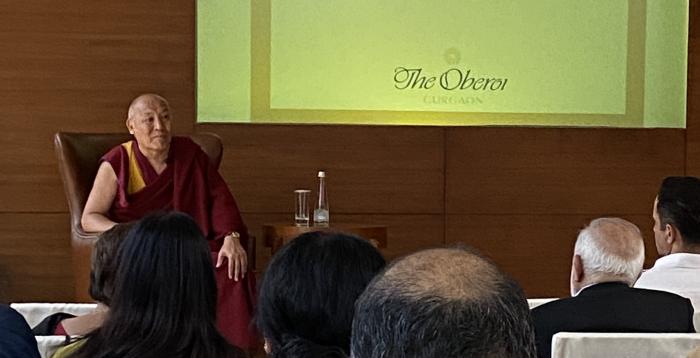Achieving Happiness by Applying Wisdom in Daily Life
“We need to learn how to live our lives. Living is not merely breathing”
Venerable Geshe Lhakdor shared his thoughts on 'Achieving Happiness by Applying Wisdom in Daily Life', at The Oberoi, Gurgaon on 11 March 2020. This was a part of the ‘Ritinjali-CEP Conversations’, which is a series of interactions with leaders from many disciplines for an inspiring and thought-provoking exchange of ideas and experiences.
Geshe Lhakdor presented an insightful talk on how to apply happiness in our daily lives by taking relevant examples from our personal and professional lives. He emphasized that there is an inextricable link between one’s personal happiness and kindness, compassion and caring for others. And this is a two-way street: increased happiness leads to greater compassion, and increased compassion leads to greater happiness. There are many things we all want in life, but at or near the top of everyone’s list is personal happiness. But our society trains us to seek instant gratification compounded with a constant desire to have the newest, trendiest thing. Success has often been defined by the ability to have the most “stuff.” Most of us are wise enough to realize that a new shiny toy won’t bring us true happiness, but we tend to forget about the biggest obstacle to our happiness. This is the desire for control. We are conditioned to crave it. We seek to control our circumstances and our relationships, both at work and home.
Geshe Lhakdor highlighted the importance of having the right perspective. If we utilize our favorable circumstances, such as our good health or wealth, in positive ways and by helping others, they can be contributory factors in achieving a happier life. And of course, we all enjoy outwardly material facilities and success. But without the right mental attitude and without attention to the mental factor, these things have very little impact on our long term feelings of happiness.
Geshe also discussed the true purpose of education. These days, when we talk about education, people think and assume that education is all about literacy---reading, writing and Mathematics. If you have that literacy, one may easily get a job. However, in that scenario, there is no personal growth. Education in actuality means personality development, and human flourishing needs to be the goal of education. Whether one gets a formal education or not is not irrelevant. One needs to live a life which eventually flourishes, following which his/her family flourishes and subsequently, the country flourishes with happiness, well-being and harmony. That is the real purpose of education in one’s life.
Geshe’s messages pointed out that his beliefs are not based on blind faith or religious dogma but rather on sound reasoning and direct experience. His understanding of the human mind and behavior is based on a lifetime of study. Although his views are rooted in a tradition that dates back over twenty-five hundred years, they are also tempered with common sense and a sophisticated understanding of modern problems. His appreciation of contemporary issues has been forged as a result of his unique position as a world figure, which has allowed him to travel the world. His approach has been shaped by his exposure to diverse cultures and people from all walks of life as well as exchange of ideas with the top scientists, religious heads and political leaders. What Geshe sought to provide is a wise approach to dealing with human problems that is at once realistic and optimistic.


